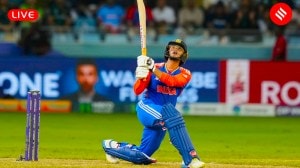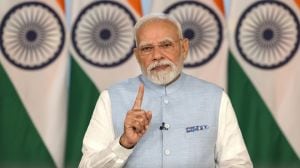‘If I was in India, I would be most concerned about war with Iraq’
Post-Pokhran II, when Indo-US ties were at their lowest, seeds for a revival were sown by Strobe Talbott, then deputy secretary of state in ...

Post-Pokhran II, when Indo-US ties were at their lowest, seeds for a revival were sown by Strobe Talbott, then deputy secretary of state in the Bill Clinton administration, and then Indian external affairs minister Jaswant Singh, during 10 rounds of security dialogue. It also laid the foundation for the Indian summer that is still continuing in Washington. On a private visit to Delhi, Talbott, now president of the Brookings Institution, shared his world view with Saikat Datta. Excerpts:
Are you satisfied with the way the George Bush administration has carried the relationship forged by you and Jaswant Singh forward?
The Bush administration deserves credit for continuing the process of developing the relationship between India and the United States…It is one area of continuity between the two administrations and we have to make the relationship worthy of what the two countries have in common. The Cold War is behind us, not just in terms of the Indo-Soviet relationship but also in terms of the Indo-US relationship, what it was since 1949 and began to change in 2000.
US Ambassador Robert Blackwill and Indian Ambassador Lalit Mansingh also deserve credit. In international relations, personal relationships matter and the Clinton-Vajpayee as well as the Bush-Vajpayee relationship has been very good. Even at the working level, both countries have an excellent relationship and have a good team on both sides.
There have been important milestones in the new relationship and the establishment of the High Technology Cooperation Group last week is seen as one. How much will this help build confidence on both sides?
It is a major development and it is important to develop areas of cooperation as broad as possible. India has tremendous prowess in the high-technology area. Even issues associated with the non-proliferation regime can be discussed as the bilateral relationship goes forward.
Even issues pertaining to dual-use technology and civilian applications of space and nuclear technology?
That is a persistent issue, stemming from India’s decision to be a nuclear weapon state outside the Non-Proliferation Treaty. It sets up a host of strategic and legal issues. So it is in a different category and needs to be managed.
But do you think the Indo-US relationship has been able to side-step a Pakistan-centric prism?
Not really. The extraordinary, complex and deep-seated and dangerous animosities which exist between India and Pakistan are a challenge for American diplomacy. These existed during the Cold War and will continue to exist for a long time to come. This is the perfect example of a zero-sum relationship. It is a profoundly zero-sum relationship and has a long-standing tendency of standing on one side of the line and viewing the US as being contrary to its own interests.
During the Cold War, the US looked for allies where it could find them and it found Pakistan. Pakistan also served as the intermediary between the Sino-US talks. All this led to an accumulation of suspicions on the Indian side. But circumstances are different today.
And the difference today is…
Now there is a new situation after 9/11. The US no longer looks at the world as ideologically different, but now looks at the world as a war against terrorism. Once again it is looking for allies (and enemies) and has found both. President (Pervez) Musharraf’s decided to throw in his lot with the US against the Taliban. But there is a different view in New Delhi. But we have to be careful not to get into a repetition of conflicting perceptions between New Delhi and Washington on the unhappy legacy of the Cold War.
Americans need to understand how Indians feel and why. But it is also important for Indians to understand the view from the American vantage point and why we are talking to President Musharraf.
So how does one deal with Indo-US-Pak and its, at times, conflicting interests and viewpoints?
I call it the hyphen problem… where you insert it in international relations. But the hyphen was not inserted by us. It was the media, the Indians, the Pakistanis. What we need to do is look at our relationship with a perspective on other regions in the world where we share strategic interests. It could be Central Asia, South East Asia, the Middle East and the Gulf. We should be spending a lot of time on sharing our perceptions on China. Which does not mean that we are colluding against China. In fact we can use our channels with the Chinese to solve long-standing issues between India and China.
There is a theory in strategic circles that India is viewed as a buffer by the US against China…
That is a bad theory. It is ridiculous to think of India as a pawn on a geopolitical chess board. And India is definitely not a pawn, but a very major piece. But we need to avoid such theories because theories like these were part of the reason why Indo-US ties got off to such a bad start.
Do you think a possible war in Iraq is a legacy of the earlier Bush administration to the present one?
There is an element of truth that President George Bush came into office with a glint in his eye as did Vice-President Dick Cheney. In many ways it is the unfinished business of the Bush Sr administration and also the Clinton administration, since it was in power in the eight intervening years.
But isn’t the US isolated in its pursuit of a more aggressive stance on Iraq?
I don’t think the US is isolated. There is opposition, controversy and debate but the last time the UN Security Council voted, resolution 1441 was passed unanimously. Fifteen members voting for it, with no opposition, is not isolation. The US is not alone. The UK is a pretty significant country and they are at least three-and-a-half squares behind it. Even the Spanish and Italian prime ministers as well as Central Europe have agreed to the US stand. Germany has taken a strong opposition against the US stand and is a member of the Security Council, but that is not isolation, it is a dispute.
But is a war with Iraq justifiable?
I think President Bush is 100 per cent right that Saddam (Hussein) is a mortal threat to peace in the region on a short-term basis and a threat to world peace on a long-term basis. Bush is also correct that Saddam is assiduously trying to develop weapons of mass destruction of all three varieties. Iraq has been flagrantly violating a decades worth of UN resolutions. But I have a few reservations.
It is quite evident that we will have a war against Iraq in March 2003. It is overwhelmingly possible and the (US) administration has put us on a track that leaves little room for manoeuvre on the timing and mustering international support for a war. President Bush has built up a lot of pressure and something has to give. If events are such that Saddam is moved without a war, a lot of credit goes to Bush.
What are the implications of a war with Iraq on the subcontinent?
If I was in India, I would be most concerned. Nearly four million Indians work in the Gulf and get nearly $7 billion as remittances. I would also be worried about the spike in oil prices. I have lot to worry about what the consequences of the war will be on Pakistan. There could be a much worse leadership in Pakistan. I don’t think a military leader who comes to power through a coup could be the best leader. We must pray that the war in Iraq is a quick and contained one. If it spreads and is protracted, it will have dire consequences.
But doesn’t the US position on Iraq and Pakistan reflect a dichotomy in its foreign policy. The Indian Government has given evidence on Pakistan promoting cross-border terrorism and Deputy PM L.K. Advani is on record that India has provided more evidence to the international community than the US offered before it went into Afghanistan and now Iraq.
I am two years out of date, but when I was in government, the administration took any credible piece of evidence on terrorism in either direction very, very seriously. I am quite sure so does the Bush administration. There is no doubt that there has been Pakistan-inspired violence inside India and have no doubt that the view given by the Indian Government to the US has been taken.
Finally, the trade between India and the US has been a disappointment on both sides…
We need to do everything to promote free and fair trade. In the past it has been greatly affected by domestic politics in both countries. Today the Indian economy is proving to be amazingly resilient and sectors like telecom have shown tremendous progress. It has extraordinary talent in high-technology areas. But over-arching the trade and commerce issues is the very nature of commerce relationships. But I hope that we have put the distrust behind us and developed a natural relationship. These have been 40 lost years, but better late than never.
Photos



- 01
- 02
- 03
- 04
- 05



























